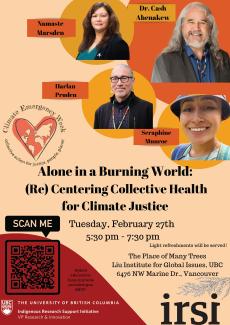Alone in a Burning World: (Re) Centering Collective Health for Climate Justice
February 27, 2024, 5:30 pm to 7:30 pm

Biographies
Namaste Marsden has over twenty years experience with First Nations and Indigenous programs, First Nations rights, title, governance, research and evaluation, data sovereignty, policy development and implementation, with a focus to moving to rights recognition. She has been instrumental in developing capacity and leadership for key initiatives such as the International Journal of Indigenous Health, First Nations Health Authority partnerships in ethics and OCAP®, and her nation Gitanyow moving towards traditional governance in its Lax’yip. She currently serves as Co-Chair of Research Ethics BC Advisory committee and member of BC Office of Patient Centred Measurement Indigenous Advisory Committee
Harlan Pruden (nēhiyo/First Nations Cree), works with and for the Two-Spirit community locally, nationally and internationally. Currently, Harlan is an Indigenous Knowledge Translation Lead at Chee Mamuk, an Indigenous public health program at British Columbia Centre for Disease Control, and is also a co-founder of the Two-Spirit Dry Lab (2SDL), Turtle Island's first research group that exclusively focuses on Two-Spirit people, communities and/or experiences.
Seraphine Munroe takes great pride as a member of the Dakelh and Sto:lo First Nations, identifying as a Ts’eke (Women), and serves as a strategic advisor for Dakelh Reconciliation initiatives. In recent years her primary focus has been negotiating title and rights with the province of BC given the pressing reality that the tangible impacts of climate change outpace the adaptability of colonial systems to address the evolving social conditions resulting from climate change and the cumulative effects of large-scale industrial logging.
Dr. Cash Ahenakew is a distinguished holder of the Canada Research Chair in Indigenous Peoples' Well-being and serves as an Associate Professor in the Department of Education at the University of British Columbia. As a member of the Ahtahkakoop Cree Nation, his research is deeply rooted in a dedication to crafting Indigenous theories, curriculum, pedagogies, and employing mixed methodologies. His work explores the intersections of Indigenous and non-Indigenous knowledge, education, methodologies, and health, navigating the complexities of this dynamic terrain.